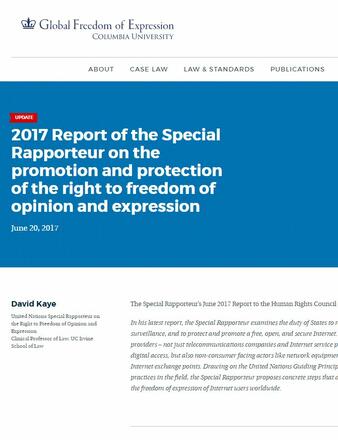
States increasingly rely on the digital access industry to control, restrict or monitor expression online. Internet shutdowns have emerged as a popular means of information control. Government surveillance continues to intensify worldwide, jeopardizing the privacy and security of millions. Net neutrality - the principle that all Internet data should be treated equally and without undue interference - has come under attack.
In this increasingly hostile environment, what are the human rights responsibilities of the Information, Communications and Technology sector ("ICT"), particularly those actors that facilitate the provision of telecommunications and Internet access and serve as gatekeepers of the digital infrastructure?
To address this question, in the Report Freedom of expression and the private sector in the digital age published in June 20, 2017 the Special Rapporteur first examines the role of States in undermining freedom of expression online, and what their obligation to protect this fundamental right entails. The Special Rapporteur subsequently evaluates the role of digital access providers: telecommunications companies, Internet service providers as well as non-consumer facing actors like network equipment vendors, content delivery networks, and Internet exchange points.
Drawing on the United Nations Guiding Principles on Business and Human Rights and best practices in the field, the Special Rapporteur proposes concrete steps that digital access providers should take to safeguard the freedom of expression of Internet users worldwide.
This report is the result of over one year's worth of study and consultation. In response to a call for submissions, the Special Rapporteur received 25 submissions from States; 3 from companies; 22 from civil society, academics and others; and 1 confidential submission.
Tags: Freedom of expression Censorship Surveillance Digital rights Digital safety WorldwideThe content of this article can be used according to the terms of Creative Commons: Attribution-NonCommercial 4.0 International (CC BY-NC 4.0) . To do so use the the wording "this article was originally published on the Resource Centre on Media Freedom in Europe" including a direct active link to the original article page.

